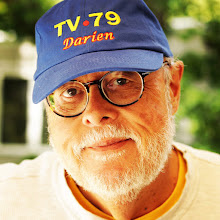Something You Should Never Say to a Reporter
As most of you know, in addition to my ‘day job’ as a media trainer, I’m also Program Director of our town’s TV station, Darien TV79. It’s an unpaid job, but I love it and believe deeply in open government. (I’m also an elected official and serve on our Board of Ethics).
Our TV station does gavel-to-gavel coverage of board and committee meetings… exciting stuff in a small town of 20,000. But we also do some evergreen programming about how town government operates under the title “Inside Town Hall.” Guess who the host is.
In my media training work I can be pretty tough during interview role playing. Think Bill O’Reilly. But on this town TV show, I try to be more like Brian Lamb of C-Span. I have no point of view. I’m only there to ask the dumb questions, like…
How did you become Chairman of the Board of Finance. How long is your term? What are you professional qualifications? What powers does the Board have? To whom do you report? How often do you meet? Etc, etc.
I even send my “guests” questions in advance so they can prep. Again… it’s supposed to be informative, not confrontational. Until two weeks ago.
Our town is preparing a collection drive for unused, unwanted prescription drugs. Citizens will drive up to a collection point, hand over their meds, which will then be sorted and properly incinerated. Why is the town doing this? Two reasons.
First, to keep drugs out of the hands of teens who have a record of abusing them, mistakenly assuming that, because they are Rx drugs, they are safe.
Second, to keep the drugs out of our environment… including our water supply.
That’s why this drug collection effort is being sponsored not only by the town health department but also a local anti-drug abuse group and Aquarion, our local water company.
But when it came time to interview the sponsors for a show promoting the effort, I hit a professional and ethical roadblock. One of the questions I wanted to ask the water company rep was, “Do you test our water for traces of prescription drugs? And if they are there, does you filtration system remove them?”
In other words, is our water safe? Pretty basic question, right?
But the Aquarion guy said “Don’t ask me that question.” And the town health department guy asked me not to piss off an important sponsor. Even the gal from the drug abuse group told me not to ask the question.
Why? Well, because Aquarion doesn’t test for these drugs because they don’t have to. The water company rep even linked me to a statement on their website. But he said the TV audience of his customers wouldn’t understand. So don’t ask and I won’t have to tell.
The AP did a five part series in 2008 about prescription drugs in water supplies. Doesn’t Aquarion think local residents read and remember such reports?
When I volunteered to be Program Director of this town TV station I didn’t check my ethics at the door. I don’t answer to town hall, but to my fellow citizens. I’m a volunteer. But I’m also a customer who wonders if his water is safe.
Bottom Line: Never say to a reporter “Don’t ask me X.” That’s not your job. Important questions should be asked. If you can’t or won’t answer, let the audience interpret that as they will.
As ABC White House correspondent Sam Donaldson once wrote: “It’s not the questions that do the damage, it’s the answers.”


1 Comments:
Dear Sir,
I agree; it is the answers that do the damage. This was a perfect opportunity for him to state how and why it would probably be impossible to test for virtually everything because of the expense involved, unfortunately he was inadequate to the task.
Originally the concern in water supplies was for pathogens; and society has done a magnificent job of providing safe water. That has changed with so many activists groups demanding all sorts of things.
I can say this with assurance. We now have the scientific capability to test for things at parts per quadrillion and lower. I just can’t remember the numerical terms any longer. At some point we will have the capability to find everything in a glass of water. The question is this; does it matter?
In the real world of real scientists these figures are meaningless since at some point the “molecular load” will be so small that the body’s cells will not respond to them. This is called the “Threshold Principle”. Anything below that is meaningless.
In chemistry it has been known for hundreds of years that the dose makes the poison. The fact that they can detect substances doesn’t mean they represent a danger or hazard. Detection isn’t toxicity.
Everything we are told should bear some resemblance to what we see going on in reality. In reality we are living longer healthier lives than any time in human history, and those societies who have been the biggest users of modern chemistry, including pharmaceuticals, have done the best. You may wisht o visit my blog, Paradigms and Demographics. Just Google it, it will come up number one.
Best wishes,
Rich Kozlovich
Post a Comment
Subscribe to Post Comments [Atom]
<< Home